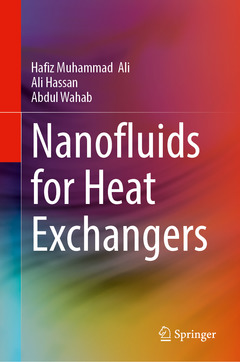Nanofluids for Heat Exchangers, 1st ed. 2023
Auteurs : Ali Hafiz Muhammad, Hassan Ali, Wahab Abdul

This book describes the importance of heat transfer in heat exchangers, and fluids properties play a vital role to increase heat transfer rate translating the size of the equipment and cuts in the capital and running cost in the long term. Nanofluids applications in heat exchangers will help to improve the thermophysical properties of the fluid and therefore heat transfer. And, this book explains the enhancing mechanisms of heat transfer by employing nanofluids in heat exchangers. A critical discussion will enable to estimate the pros and cons of such fluids in different types of heat exchangers. Prevailing working conditions for short- and long-term implementation of various types of nanofluids will be discussed and introduced to the readers.
This book helps the researchers, scientist and academicians working in the domain to be able to get a comprehensive knowledge at one place regarding the preparation, properties, measurements, data reduction, characteristics and applications of nanofluids in heat exchangers.Chapter 1 – Introduction.- Chapter 2 - Nanofluids in Heat Exchangers.- Chapter 3 - Shall and Tube Heat Exchanger.- Chapter 4 - Plate Heat Exchangers.- Chapter 5 - Double tube Heat Exchangers.-Chapter 6 - Circular Tube Heat Exchangers.- Chapter 7 - Preparation of Nanofluids.- Chapter 8 - Stability of Nanofluids.- Chapter 9 - Conclusion and Summery.
Dr. Hafiz Muhammad Ali, currently working as an associate professor of Mechanical Engineering at King Fahd University of Petroleum and Minerals, Saudi Arabia, received his doctoral degree in mechanical engineering from School of Engineering and Materials Science, Queen Mary, University of London, United Kingdom, in 2011. He was a postdoc at Water and Energy Laboratory of University of California at Merced, United States, during 2015–16.
He is a noted faculty member having thermal sciences, heat transfer and solar energy as his major areas of interest. Over the span of several years, he supervised numerous undergraduate and postgraduate students, and his work produced more than 200 papers featured in various reputed international journals. He also represented his institution and Pakistan at several international and national conferences as an invited speaker and delivered various keynote talks. His other research interests include electronics cooling, condensation, nanofluids, heat transfer devices and thermal management.
He is the recipient of the “Best Young Research Scholar Award” for 2017 in the Engineering category, conferred by Higher Education Commission of Pakistan at the 7th HEC Outstanding Research Award Ceremony. He also had the honor of receiving HEC’s Best Research Paper Award (2013/2014) and Research Productivity Award by Pakistan Council of Science and Technology (2016–17). Apart from his academic duties, he is actively involved with editorial duties at several international journals, notably Heat Transfer Engineering (Taylor & Francis), Journal of Thermal Analysis and Calorimetry (Springer), International Journal of Thermofluids (Elsevier), Journal Thermal Science and Journal of Mechanical Engineering.
Ali Hassan has done his graduation in mechanical engineering from University of Engineering and Technology, Taxila. During his graduation, he worked on various projects rel
Date de parution : 09-2022
Ouvrage de 153 p.
15.5x23.5 cm



